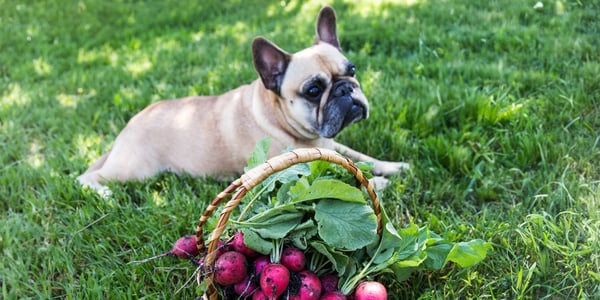Index:



Can dogs eat radishes?
Are you wondering if dogs can eat radishes? It can be tempting to share some crunchy vegetables with your pup, but not all human foods are suitable for them.
Let’s explore if radishes are safe for dogs, their potential health benefits, and how to serve them correctly to keep your dog’s diet balanced and safe.
Are radishes safe for dogs to eat?
Yes, radishes are safe for dogs to eat. These root vegetables are low in calories and packed with nutrients such as vitamin C, fibre, and potassium. Radishes can be safe for your dog when served properly and in moderation.
But it's important to note that too many radishes may cause gastrointestinal upset or even diarrhoea in some dogs.



The benefits of feeding radishes to your dog
Radishes can offer certain health benefits when given to dogs. Here are some reasons why radishes are good for dogs:
Rich in vitamins and minerals: Radishes are high in vitamins and minerals, including vitamin C and potassium. These nutrients are essential for supporting your dog's immune system and keeping your dog’s overall health in check.
Helps remove plaque: The rough texture of radishes can help remove plaque from your dog’s teeth, promoting better dental hygiene.
Low in calories: Radishes are also a low-calorie snack, making them an option for dogs who need to manage their weight.
Safety tips for feeding radishes to dogs
While radishes are safe and healthy for most dogs, there are some safety tips to keep in mind to ensure your pup stays happy and healthy:
Moderation is key: Feeding radishes in moderation is essential. Many radishes can lead to an upset stomach or gastrointestinal upset.
Cut Radishes into small pieces: To prevent a choking hazard, it is recommended to cut radishes into small pieces before giving them to your pooch. This also makes it easier for your dog to eat.
Serve plain radishes: Always serve plain radishes to your dog. Avoid adding any seasonings, oils, or other ingredients that may be toxic for dogs.
Avoid horseradish: Horseradish isn’t safe for dogs. Its spiciness can cause gastrointestinal upset, so it should not be given to your pup.



Potential risks of feeding radishes to dogs
Although radishes are safe for dogs, there are some potential risks involved:
Gastrointestinal upset: Some dogs don’t tolerate radishes well, which may lead to an upset stomach or even diarrhoea. Always observe your dog after introducing a new food.
Choking hazard: Large pieces of radish may be difficult for dogs to chew and could present a choking hazard. It is best to give your dog a radish that has been cut into small pieces.
How to feed radishes to dogs
Radishes can be included in your dog's diet in various ways, but care should always be taken to ensure it is done safely:
Raw or cooked radishes: Radishes can be fed to dogs either raw or cooked. However, they should always be plain without added ingredients.
Introduce slowly: When first introducing radishes to your dog, start with a small amount to ensure there are no adverse reactions. Fed in moderation, radishes can be a healthy treat.
Combine with other vegetables: You can add radishes to a mix of other vegetables that are safe for dogs. For example, like carrots, radishes can provide a crunchy and nutritious treat.



Radishes vs. other vegetables for dogs
Other foods dogs can eat



Veterinary advice on feeding radishes to dogs
If you are unsure about feeding radishes to your dog, it is always best to consult a veterinarian.
They can provide specific guidance based on your dog’s health status and dietary needs. Keep in mind that every pup’s tolerance to new foods is different, so careful monitoring is necessary.
For those who are worried about unexpected medical issues, pet insurance can be helpful.
Pet insurance can cover the cost of veterinary visits in case your dog experiences adverse effects from eating something new.
Conclusion - Can dogs eat radishes?
So, can dogs eat radishes? The answer is yes, but only in moderation. Radishes are safe for dogs and can be a healthy, low-calorie treat that offers vitamins and minerals.
However, care must be taken to avoid potential risks such as gastrointestinal upset and choking hazards.
Always remember to consult a veterinarian if you are unsure about adding new foods to your dog’s diet. With proper precautions, radishes can be a nutritious addition to your pup’s balanced diet.
Waggel Pet Insurance
Need more help? You're in luck if you're a Waggel Pet Insurance member. Along with our excellent coverage, we offer access to a 24/7 online vet to answer all your sticky questions, especially if you need grooming assistance.
Not a member? Why not get a quote now and cover your furry friend for a range of illnesses, all while enjoying our amazing perks and rewards.
Want more like this?
Get updates from us with helpful info, advice, answers to frequently asked questions and much more.
Index:
- Can dogs eat radishes?
- Are radishes safe for dogs to eat?
- The benefits of feeding radishes to your dog
- Safety tips for feeding radishes to dogs
- Potential risks of feeding radishes to dogs
- How to feed radishes to dogs
- Radishes vs. other vegetables for dogs
- Other foods dogs can eat
- Veterinary advice on feeding radishes to dogs
- Conclusion - Can dogs eat radishes?
Related posts:
Get your quote
Along with our excellent coverage, we offer access to a 24/7 online vet to answer all your sticky questions.





